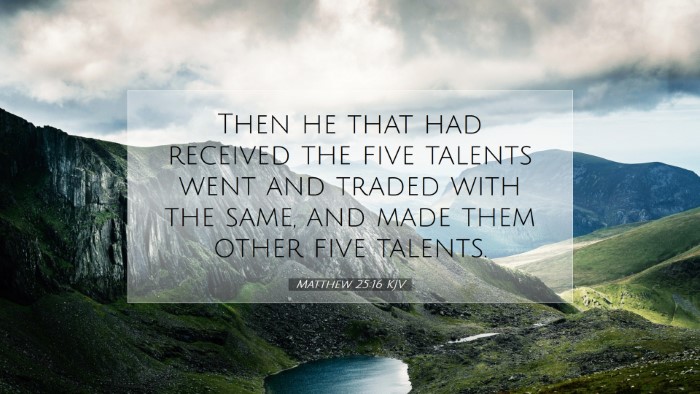Commentary on Matthew 25:16
Matthew 25:16 states: "Then he that had received the five talents went and traded with the same, and made them other five talents."
Introduction
This verse is situated within the Parable of the Talents, a significant teaching of Jesus that illuminates themes of stewardship, accountability, and the responsibility inherent in God's gifts. Esteemed commentators such as Matthew Henry, Albert Barnes, and Adam Clarke provide valuable insights into the meaning and implications of this text for believers.
Contextual Background
The parable itself is a part of Jesus' Olivet Discourse, where He speaks of the end times and the necessity of readiness. The talents represent the various gifts, resources, and opportunities entrusted to individuals by their master. This verse specifically highlights the actions of the servant who received five talents, emphasizing diligence and productive stewardship.
Insights from Commentators
Matthew Henry
Matthew Henry elaborates on the significance of the talents as a metaphor for the gifts and abilities bestowed upon each individual by God. He highlights the responsibility that comes with such gifts and the expectation that believers engage in productive activity, enhancing what has been given to them.
- Engagement with Gifts: Henry notes that the servant’s immediate action of trading with the talents indicates a proactive approach. Each servant is expected to utilize their gifts with the intent to increase their effectiveness and value.
- God’s Expectation: Henry emphasizes that God expects a return on His investments. This return symbolizes the spiritual fruits that believers should cultivate through their actions and faithfulness.
Albert Barnes
Albert Barnes provides a critical examination of the cultural and societal norms regarding wealth and responsibility in Jesus’ time. He points out that the five talents signify a significant responsibility, and the act of trading reflects a wise and industrious character.
- Accountability: Barnes underscores the notion that the servant was entrusted with considerable wealth, denoting that greater responsibility obliges a greater output. The servant’s decision to trade signifies an understanding of stewardship as a form of service to the master.
- Risk and Reward: He also discusses the risk associated with trading, suggesting that it is often through stepping out in faith and taking risks that believers can achieve greater results for the kingdom.
Adam Clarke
Adam Clarke approaches this verse with a focus on the implications of faithfulness and the nature of the servant's actions. He argues that the servants’ willingness to engage in trade with the talents reflects their understanding of their master’s character.
- Understanding God’s Nature: Clarke posits that the diligent servant has a clear perception of his master's expectations and nature, and thus acts in accordance with that understanding.
- Faith as Action: The act of trading is a demonstration of faith in practice. Clarke emphasizes that genuine faith leads to action, and a true servant will seek to multiply what they have been given.
Theological Implications
The theological implications of Matthew 25:16 are profound. The verse serves as a reminder of the seriousness of one's vocation as a believer. It invites reflection on the ways in which individuals are actively engaging with the gifts and resources entrusted to them by God.
Stewardship as a Core Principle
Stewardship is not merely a financial concept; it is a holistic approach to life that encompasses time, talent, and treasure. Believers are called to recognize their role as stewards and to assess their engagement with worldly resources.
Preparation for Accountability
This verse also prepares believers for the accountability that will come at the end of time when all must give an account of their stewardship. It challenges individuals to evaluate whether they are actively involved in the work of the kingdom.
Conclusion
Matthew 25:16 calls individual believers to reflect on their stewardship, engage deeply with their gifts, and trust in God's provision as they work towards His kingdom. The insights offered by commentators Henry, Barnes, and Clarke encourage a profound commitment to live a life that actively seeks to multiply the talents given.
Encouragement for Believers
As you contemplate this verse, consider how you might trade the talents entrusted to you in creative and impactful ways that honor the Lord and serve the needs of others.


